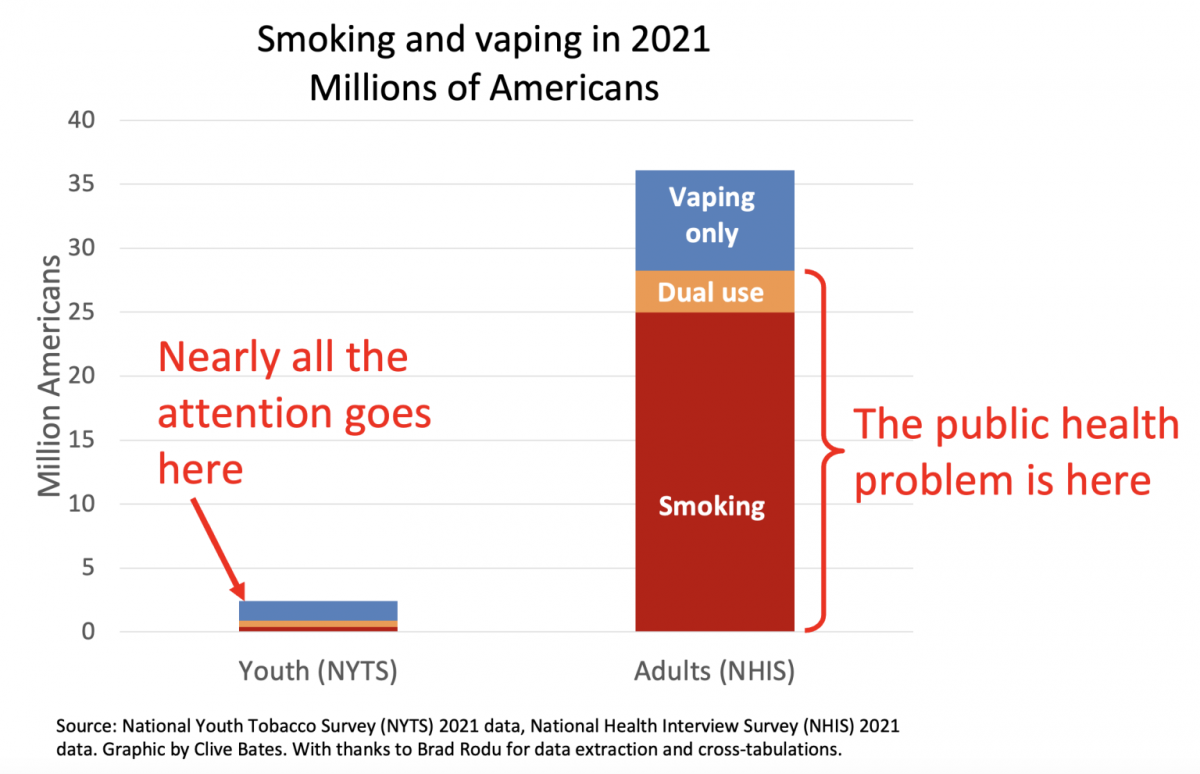Walking 300m from the GFN conference at the Marriott hotel, you arrive at the Złote Tarasy shopping centre. The first kiosk through the doors specialises in disposable vape products, the source of so much ire in the vaping community – yet clearly the most popular vaping device produced to date.
Hop in a car and take a 182km drive, you’ll arrive at the Bełchatów power station, the two 300 metre chimneys numbering among Poland's tallest structures. Next door, the Bełchatów strip mine which supplies the lignite to keep the turbines in operation – producing around 40 million tons of carbon dioxide. It’s the largest power station of its type in Europe. We are in the correct location to discuss environmental pollution.
Planet of the Vapes has a long history of urging the vape industry to act in a more sustainable fashion – something that became increasingly important with the advent of disposable vapes. We have been imploring manufacturers to address sustainability for well over a year.

The issue is twofold: the toxic lithium in disposable batteries that could otherwise be reused, something important for a much in demand finite resource, and the single-use plastics.
Disposables cause a waste issue on streets, an environmental issue in landfills, a safety issue in refuse centres and trucks.
Then there is the thorny subject of who uses them.
The panel and audience consisted of designers, manufacturers, wholesalers, retailers, consumers, advocates and environmental experts. Surely if any group of people could come up with a workable way forward this one would?
The panel suggested that while the industry and harm reduction advocates are quick to point to the reduced harm of vaping when compared to smoking, the same could apply to the environment.
With 78% of tobacco industry’s carbon emissions coming from the growing and curing of tobacco leaf, the industry dwarves the Bełchatów power station’s CO2 emissions by almost a factor of four.
The synthetic nicotine used in disposables delivers a huge benefit, and something that is rarely (if ever) mentioned.
Defenders of the Bełchatów Power Station point to the fact that it has enabled Poland to maintain its energy independence and resist the price rises like those seen in the UK. But arguing this to support the notion of keeping it running into the future is akin to trying to convince local councils that the discarded disposables they complain about on their streets are actually offering a kind of environmental dividend.
The toxic nature of discarded cigarette and heat-not-burn butts is something that has gained a lot of traction in recent debates and sparked the “polluter pays” conversation. The conference heard that maybe a similar process could be operated for disposable manufacturers.
Colin Mendelsohn mentioned that a similar scheme is in operation in Australia for televisions and mobile phones – one where a tax is placed on the importation of those products and directed towards the recycling of those products come product expiry. The trouble with dealing with vapes in a similar fashion, he explained, is that government officials refuse to talk to industry representatives.
The UK has recently moved in this direction too to an extent. Of the two vape trade bodies, the government will only talk to one due to the other having members linked to the tobacco industry.

Paraphrasing a point from the audience, if disposables are posing such a problem, why don’t we just ban them?
The first issue here is that they would be seen of as “low hanging fruit”. A ban on disposables – or aspects of them such as flavours – could easily be used to springboard on to harsher restrictions for other vape products.
Also, session host Alex Wodak pointed to the failure of bans to achieve their fundamental aims. Alex brought up the subject of heroin; the drug was banned in Australia in the 50’s and yet in an annual survey Australians are asked to rank how easy or difficult it is to source supplies of it. In 2022, 80% of respondents stated that it was “Easy” or “Very Easy”. Clearly an abject failure in policy.
It doesn’t take long to think up examples of how this approach is already failing when applied to vapes.
In April, Planet of the Vapes reported how Thailand’s approach is a complete fiasco. The country hasn’t just banned vapes and vaping – it’s done it multiple times because each time the law was completely ignored.
Vapes are easy to come by in stores, online, and from people wandering about selling them from trays hanging from their necks. Vaping takes place on the streets, in homes, in bars, being dealt with by the corrupt police as an opportunity for extracting bribes rather than legislative enforcement.
The ban in Thailand, as with the de facto ban in Australia, has achieved nothing apart from giving a boost to the black market. Rather than affirming control, the countries have handed it over to criminals – they no longer control the ingredients, device safety, or who gets to use them.

That final point raises the subject of youth use, something commentators and legislators are fixated on. Something, Clive Bates has pointed out in his simple graphic, that is missing the point.
Are children going to recycle their illicit products? If you are sourcing your product from the black market, you aren’t going to come across a recycling scheme.
One of the UK industry’s solutions comes in the form of increasing tank size, thereby increasing the cost and reducing the volume of disposables requiring processing. This accords with the ASH/CRUK demand for disposables to be made unaffordable to children.
But teens are already buying these products, they are already being sold from corner shops and shady websites. Such approach would seem to offer nothing but increased unit margins and debateable gains in sustainability.
A number of years ago, GFN heard from someone pointing out another problem with restricting access to disposables. Dr Sharon Cox informed conference about how low-priced, easy to use, delivering consistently good experience products really appeal to adult smokers experiencing homelessness. The same can be said for adult smokers with dexterity issues, addiction, or living with poor mental health. Long term heavy smokers like these have always been the most resistant to quit programs and yet Dr Cox has very positive results from trialling these products. Where does restricting access through flavour ban, product ban or increased price leave them?
Surely the simplest solution for recycling is to compel all stores selling disposable vapes to offer a free collection service – either freepost or on-site bins? Surely the best solution is to have manufacturers fund this?
We won’t know. Despite having major disposable manufacturers in the audience, they remained tight-lipped on the subject, they didn’t seem keen on them being the polluter that pays.
In summing up, Colin Mendelsohn stated that the solution needs government involvement as there will always be players who don’t cooperate – and they need to incentivise consumers to take part in the clean-up – warning that the whole subject will become weaponised otherwise.
But aren’t we at that point already?
Look at the conversations taking place in the House of Commons, look at our regular Parliament articles, disposable vapes have become a political football to be booted around for point scoring in the build-up to the next election…and almost definitely beyond it.
Manufacturers have failed us. This has been a problem in the making since the TPD banned 50 and 100ml glass bottles. Over the years we have seen almost no imagination or desire to come up with inventive solutions from the industry. We currently stand at the point where calls to ban flavours, attack branding, restrict marketing and completely eliminate product types are consistently being given airtime. Manufacturers and retailers don’t have the luxury of waiting for a cross-platform body of stakeholders to agree on a silver bullet approach in the UK because every day lost is one step closer to an American or Australian future. Action isn’t optional anymore – it’s imperative.
References:
- GFN23 - https://gfn.events/
Photo Credit:
Article images (c) Dave Cross, author
Dave Cross
Journalist at POTVDave is a freelance writer; with articles on music, motorbikes, football, pop-science, vaping and tobacco harm reduction in Sounds, Melody Maker, UBG, AWoL, Bike, When Saturday Comes, Vape News Magazine, and syndicated across the Johnston Press group. He was published in an anthology of “Greatest Football Writing”, but still believes this was a mistake. Dave contributes sketches to comedy shows and used to co-host a radio sketch show. He’s worked with numerous vape companies to develop content for their websites.
Join the discussion
Harm Reduction For The Rich
The United Kingdom risks becoming a harm reduction country only for the wealthy, according to Michael Landl of the World Vapers’ Alliance
Sacrificing Health For 2p Cut
Tory Government alienates vaping voters with its mission to cut tax by an unaffordable 2p to attract voters by placing a tax on vape products in the forthcoming budget
Scotland Announces Single-Use Vape Action
A ban on the sale and supply of single-use vapes in Scotland is due to come into effect on 1 April 2025, under proposed legislation published today
Industry Licensing Scheme Proposed
A vape industry licensing scheme will generate £50m+ per year to combat underage and illicit vape sales according to industry experts












